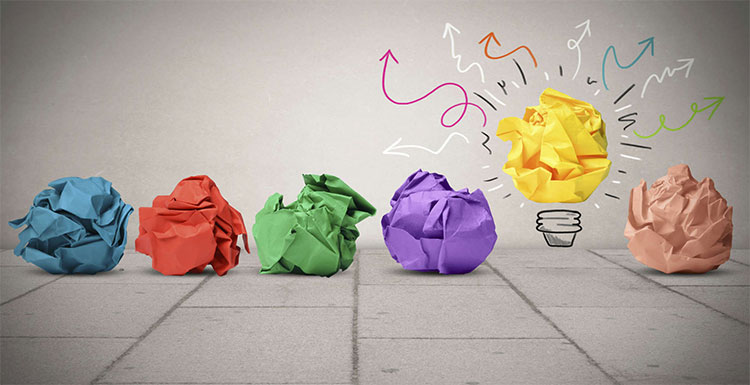Science has proven that going 'more' will be more creative!
In the ancient world, the Greeks believed that 9 poetic gods (or 9 muse- 9 Muses) were the ones who inspired the mortals and the moments of ecstasy, exploding new human ideas also comes from these 9 gods.
Today, people certainly no longer believe in such myths, but people still like to hear stories of outrageous ideas, such as Newton from an apple inventing the law of universal gravitation, Archimedes is in a bath that solves the weight problem and how things float.
Although these stories are only legends, people today still enjoy listening and sharing them.
However, for today's workers, especially the office world, these stories do not provide much practical advice. Today, employees cannot sit idly by a tree waiting for an apple to fall or lie in a bathtub and run naked out on the street just to find a solution to a problem.
However, today's scientific research shows that employees today can use many different ways to create such ecstatic moments.

The moment of trance often comes when the human mind does not focus on solving difficult problems.
Go to the toilet more
Scientists recommend that we should take more frequent breaks, go to the toilet, drink water or temporarily leave the mind if the problem is difficult to solve.
The reason for the above advice is actually proving the trance moments often come when the human mind does not focus on solving difficult problems, also called the incubation period (Incubation) in psychology. learn.
In particular, the suspension of work and leisure breaks will make the breakthrough idea slowly cherished, unconsciously formed. This is the same as when Newton sat and watched the apple fall or Archimedes in the bath.
A recent study by expert Sophie Ellwood proved this hypothesis. Ellwood divides 90 students into 3 groups and asks all students to take the test, namely write all the effects they can imagine in the exam. In this way, Ellwood can check the creativity of each group.
Group 1 completed the exam in 4 minutes continuously. Group 2 was interrupted after 2 minutes and was asked to do another similar test in 2 minutes, then returned to the first test with 2 more minutes. Group 3 was interrupted after 2 minutes and was asked to do a test that had nothing to do with topic 1 in 2 minutes and was also allowed to return to the first test.
Thus all 3 groups have 4 minutes to take the first test but the results show that group 3 gives the most ideas even though it is interrupted with another test that has little relevance. After that, the second and the first group with the uninterrupted time to do the exercises give the least idea.
The above results show that, even if it is just a few minutes of breaks, the possibility of exploding ideas in the subconscious can also give more unexpected ideas than continuous concentration and stress solving problems. threads.
Researchers explain that when the brain is too focused on a problem that is difficult to solve, the human mind becomes deadlocked as the stream of thoughts continues to enter the path. In other words, it is easy for people to repeat the same directions of thinking when they have to work constantly without rest and it is difficult to come up with a new direction.
Researchers recommend that employees spend a lot of time off and let difficult problems automatically drift into the subconscious, thereby escaping the thinking path. When returning to work, our minds will be more open to see new solutions gradually form in the subconscious and this is the moment when the ecstatic moments are most revealing.
The interesting thing about the study is that experts recommend that we, especially those with limited time, try to save the unfinished jobs for these breaks. Accordingly, doing a job completely unrelated for too long can cause us to be distracted. So it is better for employees to take breaks and do things that are not too far away from work such as cleaning up junk email, clearing the desk or even just going to the toilet.
- Beautiful creative spaces that make you
- Creative presentation contest for young scientists
- Need creative ideas? Go to the bathroom to think
- 'Tips' help you think more creatively
- Creative with 'Scientific messengers'
- Vietnam ranked 76th on the list of creative indicators
- Ho Chi Minh City Children's Youth Competition, VI, 2011
- 20 artworks 'say no' to gravity
- The facts about life may be unknown to you
- Creative video celebrating Honda's 65th birthday
- A messy desk helps increase creativity
- Decipher the mystery of creative genius
 'Fine laughs' - Scary and painful torture in ancient times
'Fine laughs' - Scary and painful torture in ancient times The sequence of numbers 142857 of the Egyptian pyramids is known as the strangest number in the world - Why?
The sequence of numbers 142857 of the Egyptian pyramids is known as the strangest number in the world - Why? History of the iron
History of the iron What is alum?
What is alum?